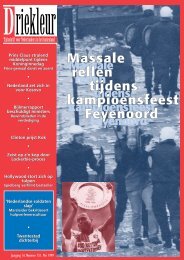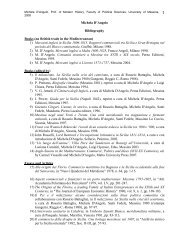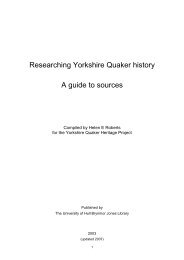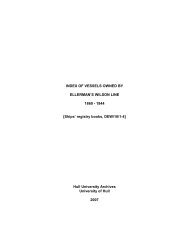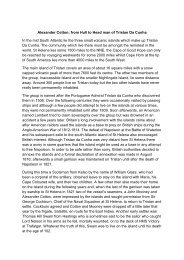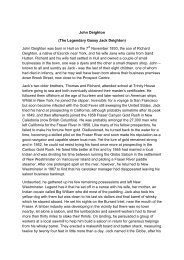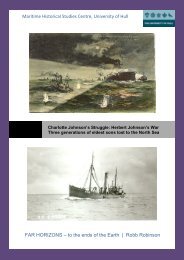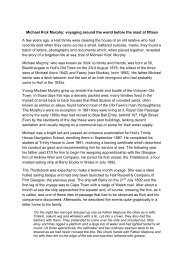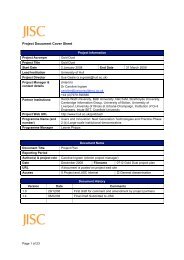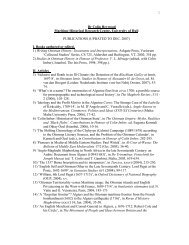The North Atlantic Fisheries, 1100-1976 - University of Hull
The North Atlantic Fisheries, 1100-1976 - University of Hull
The North Atlantic Fisheries, 1100-1976 - University of Hull
You also want an ePaper? Increase the reach of your titles
YUMPU automatically turns print PDFs into web optimized ePapers that Google loves.
<strong>The</strong> proposals were deliberated in Parliament in 1925. <strong>The</strong><br />
spokesman <strong>of</strong> the Conservatives, Halfdan Hendriksen, reminded the<br />
politicians about the Faroese wishes in the matter. <strong>The</strong> minister, Hauge,<br />
argued that this had been taken into consideration under the preliminary<br />
committee work.<br />
In the spring <strong>of</strong> 1925 the Faroese case and the resource management<br />
issue were brought before the Greenlandic Councils in a very restricted<br />
form by the Greenlandic Department. <strong>The</strong> Danish council leaders<br />
(landfogederne, the ‘sheriffs’) eased the way but Greenlandic opinions<br />
were hostile to the Faroese requests. <strong>The</strong> Southern Council accepted<br />
Ravns Storø as a more permanent land base and agreed that Greenlanders<br />
working on fishing vessels were to be trained as fishermen. <strong>The</strong> <strong>North</strong>ern<br />
Council was more restrictive and stated in its response that not just the<br />
fiords and the waters inside the outer skerries and the three nautical miles<br />
<strong>of</strong> territorial sea should stay restricted for outsiders but that the banks in<br />
international waters were also <strong>of</strong> primary interest to the Greenlanders. 155<br />
<strong>The</strong> law followed many <strong>of</strong> these intentions. Article 2 stated that:<br />
<strong>The</strong> right to catching, fishery and hunting in Greenlandic waters is exclusively<br />
preserved for native Greenlanders and others in Greenland inhabited Danish subjects<br />
and for those, to whom the Home Secretary will issue special permits according to<br />
the hitherto existing regulations (Article 11 specifies the East Greenlandic exceptions<br />
for 20 years to the Norwegians, Icelanders and Danes). 156<br />
Former prime minister Zahle, in the deliberations in the Folketing,<br />
expressed the hope that some Danish and Faroese fishermen could be<br />
stationed at Greenland to train the Greenlanders in more efficient fishing<br />
techniques. In the Landsting the Faroese propositions were mentioned<br />
gave no real concession except extended rights to take in fresh water, and mentioned that<br />
the coming Greenlandic country councils ought to be consulted in the matter.<br />
155 <strong>The</strong> Greenlandic responses were characterized by such formulations as: the resources<br />
must be preserved for “the country’s own children” (Landets egne Børn),—or: fishery<br />
inside the outer skerries and in the sea-territory “belongs to the Greenlandic population<br />
alone” (tilkommer den grønlandske Befolkning), cf. Beretninger og Kundgørelser om<br />
Grønland, 1926, 436f (Sydgrønlands Landsraads behandling, 1925, pkt. 8) and 457f,<br />
(Nordgrønlands Landsraads møde, 1925, pkt. 3).<br />
156 “§ 2. Ret til at drive Fangst, Fiskeri og Jagt i Grønlandske Farvande er udelukkende<br />
forbeholdt indfødte Grønlændere og andre i Grønland bosatte danske Undersaatter samt<br />
dem, som Indenrigsministeren meddeler særlig Tilladelse dertil efter de hidtil gældende<br />
Regler”. <strong>The</strong> law is printed in full and with comments from the committee reports in<br />
Rigsdagsaarbog, 1925, 153-160.<br />
75



